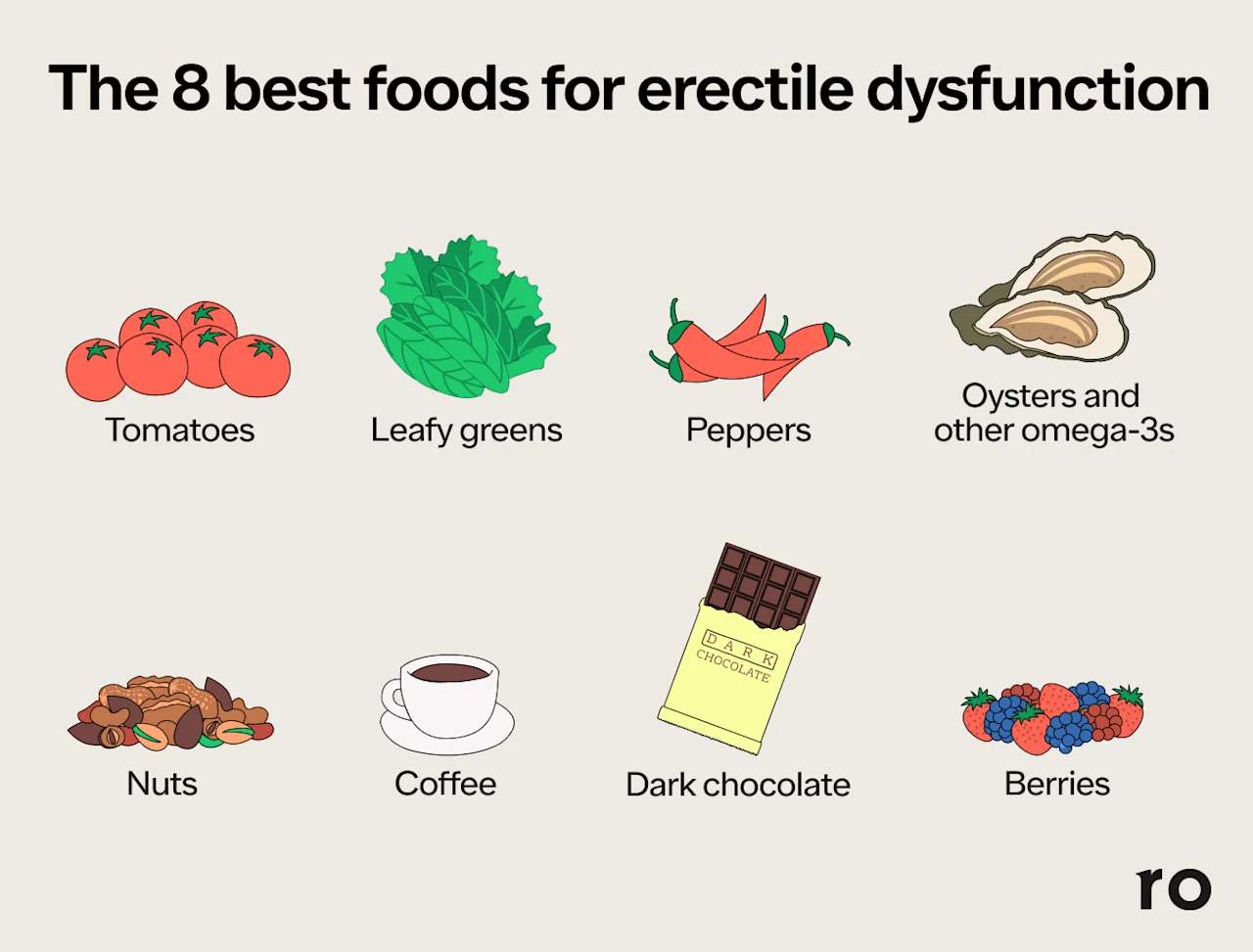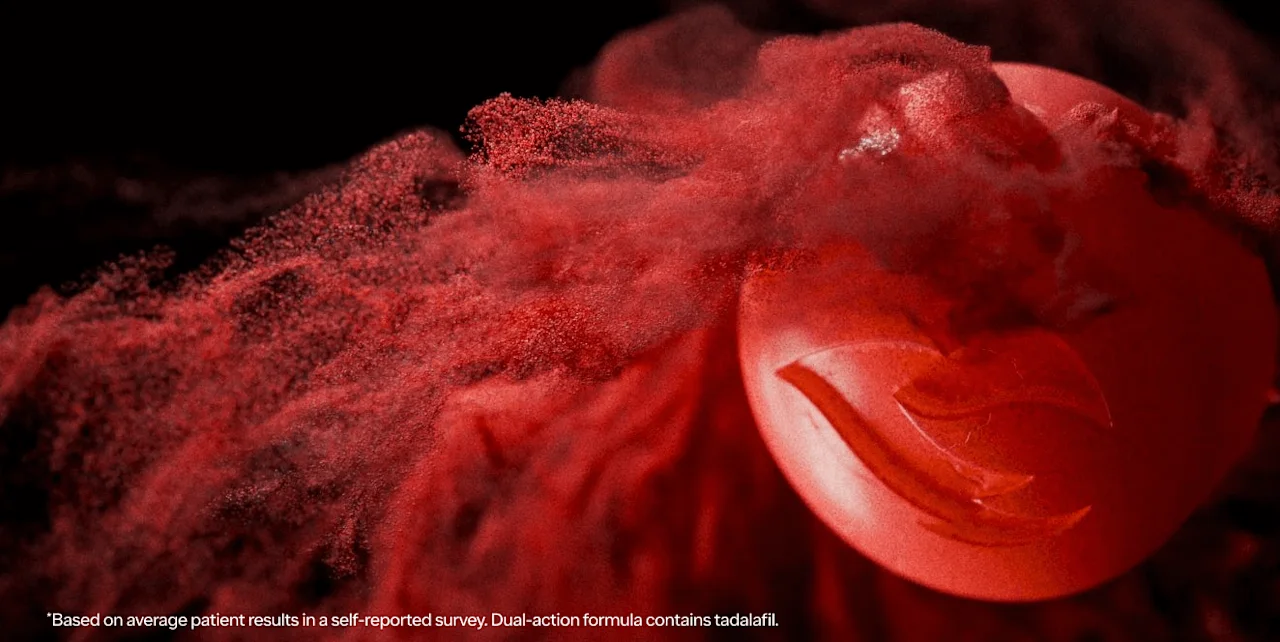Key takeaways
Eating a heart-healthy diet that supports blood flow, among other functions, can help promote healthy erections.
Foods for erectile dysfunction (ED) include tomatoes, leafy greens, peppers, oysters, nuts, coffee, dark chocolate, and berries.
In addition to following a balanced, nutritious diet, maintaining other healthy lifestyle habits, such as regularly exercising, taking care of your mental health, and getting solid sleep, can help treat ED.
Here's what we'll cover
Here's what we'll cover
Here's what we'll cover
Key takeaways
Eating a heart-healthy diet that supports blood flow, among other functions, can help promote healthy erections.
Foods for erectile dysfunction (ED) include tomatoes, leafy greens, peppers, oysters, nuts, coffee, dark chocolate, and berries.
In addition to following a balanced, nutritious diet, maintaining other healthy lifestyle habits, such as regularly exercising, taking care of your mental health, and getting solid sleep, can help treat ED.
Struggling to get and maintain erections strong enough for satisfying sex? You’re not alone—erectile dysfunction (ED) is quite common. The good news is there are many safe and effective treatments for ED, ranging from prescription pills to penis pumps. But if you’re looking for an alternative (or additive) to ED treatment, you might wonder if there are foods that help you stay erect. The answer is complicated: yes and no.
Maintaining a diet that supports a healthy heart and improves blood flow can bolster your erections. Food alone won’t work the same way medications like Viagra (sildenafil) do, but a nutritious diet may help prevent diseases that can contribute to sexual dysfunction.
If you have ED or want to improve your sexual performance, some foods may help you have better erections and a more satisfying sex life. Let’s dive in.
Can foods help erectile dysfunction?
While no single food can instantly fix ED, long-term dietary choices can play an essential role in helping you achieve optimal sexual function. ED is a complex condition that makes it difficult to get or keep an erection long enough for satisfying sex, and your overall health can play a big role in making strong erections happen.
Erections are all about blood flow; if you notice you’re not getting as hard as you used to or can’t maintain a boner, it could indicate a more significant issue with blood flow in your body. Sometimes the problem is with the blood vessels that carry blood to your penis; studies have found a link between atherosclerosis (hardening of the arteries or plaque buildup on artery walls, which can impede blood flow) and ED.
Diabetes, high blood pressure, and obesity are all risk factors for atherosclerosis commonly seen in people with ED. Eating a diet high in added sugars, trans fats, and processed foods can contribute to these health issues (and increase the likelihood of erection problems). Since heart issues decrease blood flow to the penis, avoiding foods that contribute to cardiovascular disease and staying focused on maintaining a heart-healthy diet may help with erections, too.
Best foods for erectile dysfunction
No single food has a ton of research tying it to better erectile function, but foods that can stimulate blood flow or increase testosterone production may help support your sexual health and curb erection problems like ED. Here are eight of the best foods for erectile dysfunction.
1. Tomatoes
Red and pink fruits like tomatoes and watermelon are full of lycopene, a natural antioxidant that gives ruby-colored foods their rich hues. Nutrients like these may prevent erectile problems by lowering your risk of cardiovascular disease and reducing oxidative stress, which is prominent in diabetes (another contributor to ED).
One large review study found that men who ate higher levels of lycopene were at lower risk of ED.
Tomatoes, in particular, are a great source of lycopene, which may also improve sperm production and decrease the risk of prostate cancer. Other foods rich in lycopene include pink grapefruit, papaya, and guava.
2. Leafy greens
In case you need more reasons to eat your greens, they may be up there on the ED foods list. There’s evidence that inadequate folic acid (vitamin B9) is associated with moderate-to-severe erectile dysfunction. Many people who experience ED may be lacking in folic acid, found in high doses in leafy greens.
Other foods with high amounts of folate include:
Beef liver
Spinach
Beans
Grains
Asparagus
Eggs
Nuts
Dairy products
In other words, eating a diet that’s high in fruits, veggies, whole grains, and high-quality protein sources is the name of the game. In most cases, what is “heart healthy” is also “penis healthy.”
3. Peppers
Have you ever heard that spicy food is an aphrodisiac (a food that stimulates sexual desire)? There’s some thinking that there may be something to that.
Cayenne, jalapeño, and chili peppers all contain capsaicin, which is responsible for the ingredients’ heat. Capsaicin is a highly useful compound with many folk medicinal uses, such as treating arthritis pain, healing wounds, and even restoring hair health.
But what does the science say about capsaicin for ED? One small study comparing injections of a capsaicin solution directly into the urethra to a placebo found that the spicy-hot chemical improved erectile function for those men. Still, we wouldn’t recommend injecting hot sauce into your penis.
Capsaicin has been shown to potentially have other benefits for conditions like obesity and cardiovascular disease, so eating spicy peppers might indirectly improve erectile dysfunction.
Not a fan of spicy food? Eating sweet peppers (think: bell peppers) might be a better fit for you. They’re full of antioxidants called flavonoids that support heart health and circulation. Flavonoids may also be associated with fewer erectile problems. One study found that men who ate flavonoid-rich fruits had a 14% reduced risk of ED.
Other dietary sources of flavonoids include tea, wine (not too much), apples, soybeans, onions, and cherries.

4. Oysters and other omega-3s
Seafood (oysters, in particular) have also been labeled aphrodisiacs. And while that may be an old wives’ tale, these foods are a great source of omega-3 fatty acids. These healthy fats are tied to many benefits for your heart and potentially libido (sex drive). One study found that these natural fatty acids improved erectile function in rats, although more research is needed to see how this would translate into human erectile function.
Shellfish may also aid sexual function due to their high zinc content. Zinc levels significantly affect testosterone, a hormone crucial to male sexual wellbeing.
5. Nuts
A handful of nuts won’t solve all your problems, but research suggests regular nut consumption may help you stay erect.
Nuts contain high amounts of L-arginine, an amino acid used to make nitric oxide. This gas plays a critical role in getting and maintaining erections by relaxing smooth muscles in the penis and allowing blood to flow into your member.
Studies suggest that supplementing a healthy diet (like the Mediterranean diet, for instance) with mixed nuts can improve sexual function in men. Walnuts, almonds, and pecans are all good options for heart-healthy nuts.
6. Coffee
We know that caffeine has benefits like improving blood flow. And as you’ve gathered from this article, better blood flow generally equals better erections. So does that mean a cup of caffeinated coffee is the missing link? Maybe, maybe not.
Researchers have found some connections between caffeine intake and ED. In one study, men who drank around 2–3 cups of coffee a day (170–375 mg of caffeine) had lower rates of ED.
That said, the evidence wasn’t super clear, and the results didn’t hold true for people with diabetes. So, don’t expect your healthcare provider to write you a prescription for a cappuccino soon.
7. Dark chocolate
Moderation definitely applies to this one, but yes, dark chocolate is among the foods that may help you get an erection.
Remember those flavonoids we talked about earlier? These antioxidants are linked to a reduced risk of ED and aren’t limited to fruits and vegetables. Believe it or not, cocoa has one of the highest flavonoid contents of any food.
Studies also show that cocoa may improve cardiovascular health, which, as we know by now, could mean benefits for sexual function. There’s a catch, though: You have to choose chocolate with a minimum of 70% cocoa to reap any benefits. Milk and white chocolate tend to be high in fat and added sugars, which can lead to negative health outcomes.
8. Berries
Are you tired of hearing about flavonoids yet? Hopefully not, because we’ve got some more for you.
Strawberries and blueberries are high on the list of flavonoid-rich foods, which are correlated with lower risk of ED and better overall sexual function. We’re nowhere near the point where you can pop a strawberry instead of a Viagra pill, but incorporating more berries into your diet can be a great way to boost your overall health, including sexual health.
Worst foods for erectile dysfunction
If there’s a list of the best foods for erectile dysfunction, there’s also a list of the worst. A poor diet on its own is unlikely to cause ED, but it is a risk factor for medical conditions that can lead to erectile dysfunction, such as heart disease, obesity, and diabetes.
Here are some of the worst foods for erectile dysfunction:
Fried foods: Sadly, some of the best-tasting foods are also the worst for our health. Trans and saturated fats found in many fried and processed foods can contribute to atherosclerosis and other health conditions that can impact blood flow to the penis.
Foods high in sodium: While sodium is needed for overall health, a high intake has been linked to inflammation, atherosclerosis, high blood pressure, and heart disease—all of which can increase the risk of erectile problems. Processed foods, such as cold cuts, frozen foods, and packaged snacks (think: potato chips) can all be considered good examples of these not-so-ED-friendly eats.
Foods with added sugar: The trick with sugar is to get it from whole, natural sources like fruit. Consuming too many sweet drinks and foods with added sugar can wreak havoc on blood sugar levels. High blood sugar can speed up the progression of atherosclerosis and lead to other health conditions like diabetes, which can harm blood vessels and nerves crucial for getting and maintaining an erection.
Alcohol: Excessive alcohol consumption comes with a whole host of problems, including trouble getting and staying hard. Chronic drinking can mess with testosterone levels and hormone levels, both of which can negatively impact erections. Although a drink here or there shouldn’t hurt and may allow relaxation that supports sex, drinking regularly and heavily does nothing good for sexual performance, a condition aptly named “whiskey dick.” Alcohol may have additional side effects that impact sexual health, like lowering sex drive or contributing to decreased sensation during sex.
Alternatives (or additions) to foods for erectile dysfunction
Along with healthy eating, living a generally healthy lifestyle can do wonders for your performance in the bedroom. And the same can be said of prescription medications—that is, of course, if they’re deemed appropriate by your healthcare provider.
Here, a handful of different strategies for supporting your erectile health and function in addition to or in place of foods for ED.
Prescription medications
When it comes to tried-and-true treatments for ED, look no further than drugs referred to as phosphodiesterase type 5 (PDE5) inhibitors. Approved by the Food and Drug Administration (FDA), these medications work in part by increasing blood flow to the penis, which promotes stronger, longer-lasting erections. Common PDE5 inhibitors (all of which require a prescription from a healthcare provider) include:
Vardenafil (formerly available as brand-name Levitra)
Stendra (avanafil)
While the aforementioned pills are often considered the first line of treatment for ED, some PDE5 inhibitors can be found in other formulations. Take, for example, Ro Sparks, a sublingual option combining sildenafil and tadalafil (the active ingredients in Viagra and Cialis). It dissolves under the tongue, offering quick results. And then there is Ro’s Daily Rise Gummies, which deliver 7 mg of tadalafil in each fruit-flavored gummy.
Reduce stress
There’s a strong link between anxiety and erectile dysfunction (and other sexual disorders). So, getting your stress and anxiety levels under control can make a big difference in your overall mental state and erectile function.
Mindfulness-based stress reduction (MBSR) techniques are arguably the most well-studied for managing stress. They include tactics such as meditation, body scanning, and yoga—all of which can be fairly easy to start practicing and including in your routine, whether you’re struggling with down-there difficulties or just want to improve your mental wellbeing.
Exercise regularly
It’s not a secret (far from it, actually!) that exercise can benefit your health in many ways. And now that you understand the role of blood flow in erections, it’s probably not surprising to hear that getting your blood pumping in the gym can also help you in bed. After all, physical activity is known to improve cardiovascular strength and wellbeing, which is key for supporting healthy blood flow and blood pressure.
One review study showed that men who exercised regularly—especially with moderate-to-vigorous aerobic exercise—had significantly improved erectile function. Working out can also increase the production of nitric oxide, which, as mentioned above, can contribute to erectile function and health.
Get better sleep
Prioritizing better shut-eye can be a game-changer for addressing ED. Poor sleep, whether due to disorders like obstructive sleep apnea or simply not getting enough rest, has been closely linked to erectile dysfunction. Research also suggests that chronic short sleep (≤six hours) can raise the risk of ED. It’s also been tied to hormonal changes and other health issues like obesity and heart disease, which can further exacerbate erectile problems. By aiming for 7–9 hours of quality sleep each night and adopting healthy habits like reducing screen time and limiting caffeine in the evening, you can work towards improving your erections and overall well-being.
Stay hydrated
There isn’t a direct link between hydration levels and erectile dysfunction, but staying hydrated is super important for many parts of your health. So, it makes sense that inadequate fluid intake could have an impact on sexual function, too. Dehydration is bad for cardiovascular function and blood flow, which we know can translate into poor blood flow to the penis. So, you can’t go wrong with getting those recommended eight glasses of water a day.
Cut back on alcohol
We’ve touched on this one already, but it bears repeating: Drinking too much alcohol can be bad for every part of your health, and your sexual health is no exception. Keep your alcohol intake to the recommended maximum of two drinks a day (for men) to stay in a healthy range.
Quit smoking
Smoking damages the blood vessels and tissues, leading to heart disease, stroke, and more. So, it’s no surprise that smoking is linked to an increased risk for erectile dysfunction. If you smoke, quitting is one of the best things you can do for your health—and the health of your erections.
Bottom line: foods for erectile dysfunction
There are no magic foods guaranteed to give you better erections. However, a balanced diet can lower the chances of developing conditions such as diabetes and high cholesterol, which are known to play a role in erectile function.
Foods high in lycopene, folate, and flavonoids have among the best research showing positive effects for erections. These foods include tomatoes, leafy greens, peppers, dark chocolate, and berries. Of course, the best thing you can do is maintain a balanced and healthy diet.
Other possible ED-friendly foods include oysters, nuts, and coffee.
Improving your overall health through lifestyle habits can make a big difference for your sexual health. Avoid smoking, heavy alcohol use, and fried foods if you want to improve your chances of better erections.
Eating heart-healthy foods and adopting lifestyle habits like the ones above are all steps you can take to support overall health and achieve a more satisfying sex life.
Frequently asked questions (FAQs)
Is there any food that works like Viagra?
No, there’s no such food—at least not that scientists know of yet. As nice as it would be to be able to eat a bite of something delicious and get an erection in 30–60 minutes (like you would after taking a dose of Viagra and being aroused), you’re out of luck. Viagra (and related drugs, such as Cialis) are among the most potent prescription options available for as-needed treatment for ED.
What is the best fruit for erectile dysfunction?
While research is still pretty limited in this area, it seems like fruits high in flavonoids—which include strawberries, blueberries, apples, pears, and citrus fruits—have the best support for improving ED. One study showed higher total fruit intake was associated with a 14% reduction in the risk of ED. So, if you’re wondering, “What is the closest fruit to Viagra?” consider grabbing yourself a bowl of berries—just know they won’t have the same immediate effects as the little blue pill.
Can you reverse erectile dysfunction with diet?
It’s entirely possible. If your erectile dysfunction is primarily coming from poor underlying health (e.g. obesity, heart disease, high blood pressure, etc.), then changing your diet and physical activity can allow you to lose weight, increase testosterone levels, and potentially improve your sex life. Healthy bodies produce healthy erections, so it’s always a good idea to incorporate more healthy habits into your life.
DISCLAIMER
If you have any medical questions or concerns, please talk to your healthcare provider. The articles on Health Guide are underpinned by peer-reviewed research and information drawn from medical societies and governmental agencies. However, they are not a substitute for professional medical advice, diagnosis, or treatment.
Viagra Important Safety Information: Read more about serious warnings and safety info.
References
Aronson, D. & Rayfield, E. J. (2002). How hyperglycemia promotes atherosclerosis: molecular mechanisms. Cardiovasc Diabetology, 1, 1. doi: 10.1186/1475-2840-1-1. Retrieved from https://cardiab.biomedcentral.com/articles/10.1186/1475-2840-1-1
Basith, S., Cui, M., Hong, S., & Choi, S. (2016). Harnessing the therapeutic potential of capsaicin and its analogues in pain and other diseases. Molecules, 21(8), 966. doi: 10.3390/molecules21080966. Retrieved from https://www.ncbi.nlm.nih.gov/pmc/articles/PMC6272969/
Burnett, A. L. (2007). The role of nitric oxide in erectile dysfunction: implications for medical therapy. The Journal of Clinical Hypertension, 8(12), 53-62. doi: 10.1111/j.1524-6175.2006.06026.x. Retrieved from https://onlinelibrary.wiley.com/doi/10.1111/j.1524-6175.2006.06026.x
Cassidy, A., Franz, M., & Rimm, E. B. (2016). Dietary flavonoid intake and incidence of erectile dysfunction. The American Journal of Clinical Nutrition, 103(2), 534–541. doi: 10.3945/ajcn.115.122010. Retrieved from https://pubmed.ncbi.nlm.nih.gov/26762373/
Centers for Disease Control (CDC). 2024. About moderate alcohol use. CDC. Retrieved on Dec. 10, 2024 from https://www.cdc.gov/alcohol/about-alcohol-use/moderate-alcohol-use.html
Cho, J. W. & Duffy, J. F. (2019). Sleep, Sleep Disorders, and Sexual Dysfunction. The World Journal of Men's Health, 37(3), 261–275. doi: 10.5534/wjmh.180045. Retrieved from https://pmc.ncbi.nlm.nih.gov/articles/PMC6704301/
Duca, Y., Calogero, A. E., Cannarella, R., et al. (2019). Erectile dysfunction, physical activity and physical exercise: Recommendations for clinical practice. Andrologia, 51(5), e13264. doi: 10.1111/and.13264. Retrieved from https://pubmed.ncbi.nlm.nih.gov/30873650/
Durairajanayagam, D., Agarwal, A., Ong, C., & Prashast, P. (2014). Lycopene and male infertility. Asian Journal of Andrology, 16(3), 420–425. doi: 10.4103/1008-682X.126384. Retrieved from https://pmc.ncbi.nlm.nih.gov/articles/PMC4023371/
Galleano, M., Oteiza, P. I., & Fraga, C. G. (2009). Cocoa, chocolate, and cardiovascular disease. Journal of Cardiovascular Pharmacology, 54(6), 483–490. doi: 10.1097/FJC.0b013e3181b76787. Retrieved from https://pmc.ncbi.nlm.nih.gov/articles/PMC2797556/
Gao, J. X., Li, Y., Zhang, H. Y., et al. (2012). Lycopene ameliorates erectile dysfunction in streptozotocin-induced diabetic rats. Pharmazie, 67(3), 256-259. Retrieved from https://pubmed.ncbi.nlm.nih.gov/22530309/
Ibrahim, A., Ali, M., Kiernan, T. J., & Stack, A. G. (2018). Erectile dysfunction and ischaemic heart disease. European Cardiology, 13(2), 98–103. doi: 10.15420/ecr.2017.21.3. Retrieved from https://www.ncbi.nlm.nih.gov/pmc/articles/PMC6331774/
Janabi, A. H. W., Kamboh, A. A., Saeed, M., et al. (2020). Flavonoid-rich foods (FRF): A promising nutraceutical approach against lifespan-shortening diseases. Iran Journal of Basic Medicine Science, 23(2), 140-153. doi: 10.22038/IJBMS.2019.35125.8353. Retrieved from https://www.ncbi.nlm.nih.gov/pmc/articles/PMC7211351/
Karabakan, M., Erkmen, A. E., Guzel, O., et al. (2016). Association between serum folic acid level and erectile dysfunction. Andrologia, 48(5), 532–535. doi: 10.1111/and.12474. Retrieved from https://pubmed.ncbi.nlm.nih.gov/26302884/
Khoury, B., Sharma, M., Rush, S. E., & Fournier, C. (2015). Mindfulness-based stress reduction for healthy individuals: A meta-analysis. Journal of Psychosomatic Research, 78(6), 519–528. doi: 10.1016/j.jpsychores.2015.03.009. Retrieved from https://pubmed.ncbi.nlm.nih.gov/25818837/
Lajous, M., Bijon, A., Fagherazzi, G., et al. (2014). Processed and unprocessed red meat consumption and hypertension in women. The American Journal of Clinical Nutrition, 100(3), 948–952. https://doi.org/10.3945/ajcn.113.080598. Retrieved from https://www.sciencedirect.com/science/article/pii/S0002916523047627?via%3Dihub
Lazzeri, M., Barbanti, G., Beneforti, P., & Turini, D. (1994). Intraurethrally infused capsaicin induces penile erection in humans. Scandinavian Journal of Urology and Nephrology, 28(4), 409–412. doi: 10.3109/00365599409180522. Retrieved from https://pubmed.ncbi.nlm.nih.gov/7886417/
Leslie, S.W. & Sooriyamoorthy, T. (2024). Erectile dysfunction. StatPearls. Retrieved on Dec. 10, 2024 from https://www.ncbi.nlm.nih.gov/books/NBK562253
Li, S., Song, J. M., Zhang, K., & Zhang, C. L. (2021). A meta-analysis of erectile dysfunction and alcohol consumption. Urologia Internationalis, 105(11-12), 969–985. doi: 10.1159/000508171. Retrieved from https://pubmed.ncbi.nlm.nih.gov/34521090/
Lim, P. H. C. (2017). Asian herbals and aphrodisiacs used for managing ED. Translational Andrology and Urology, 6(2), 167–175. doi: 10.21037/tau.2017.04.04. Retrieved from https://pmc.ncbi.nlm.nih.gov/articles/PMC5422695/
Lopez, D. S., Wang, R., Tsilidis, K. K., et al. (2015). Role of caffeine intake on erectile dysfunction in US men: results from NHANES 2001-2004. PLOS One, 10(4). doi: 10.1371/journal.pone.0123547. Retrieved from https://journals.plos.org/plosone/article/metrics?id=10.1371/journal.pone.0123547#
Marventano, S., Vetrani, C., Vitale, M., et al. (2017). Whole grain intake and glycaemic control in healthy subjects: a systematic review and meta-analysis of randomized controlled trials. Nutrients, 9(7), 769. doi: 10.3390/nu9070769. Retrieved from https://www.ncbi.nlm.nih.gov/pmc/articles/PMC5537883/
Melis, M. R. & Argiolas, A. (2021). Erectile function and sexual behavior: A review of the role of nitric oxide in the central nervous system. Biomolecules, 11(12), 1866. doi: 10.3390/biom11121866. Retrieved from https://pmc.ncbi.nlm.nih.gov/articles/PMC8699072/
Monguchi, T., Hara, T., Hasokawa, M., et al. (2017). Excessive intake of trans fatty acid accelerates atherosclerosis through promoting inflammation and oxidative stress in a mouse model of hyperlipidemia. Journal of Cardiology, 70(2), 121–127. doi: 10.1016/j.jjcc.2016.12.012. Retrieved from https://www.sciencedirect.com/science/article/pii/S0914508717300151
National Institutes of Health (NIH). (2022). Folate. Retrieved on Dec. 10, 2024 from https://ods.od.nih.gov/factsheets/Folate-HealthProfessional/
Pipoyan, D., Stepanyan, S., Stepanyan, S., et al. (2021). The effect of trans fatty acids on human health: regulation and consumption patterns. Foods (Basel, Switzerland), 10(10), 2452. doi: 10.3390/foods10102452. Retrieved from https://pmc.ncbi.nlm.nih.gov/articles/PMC8535577/
Rippe, J. M. & Angelopoulos, T. J. (2016). Relationship between added sugars consumption and chronic disease risk factors: current understanding. Nutrients, 8(11), 697. doi: 10.3390/nu8110697. Retrieved from https://pmc.ncbi.nlm.nih.gov/articles/PMC5133084/
Salas-Huetos, A., Muralidharan, J., Galiè, S., et al. (2019). Effect of nut consumption on erectile and sexual function in healthy males: A secondary outcome analysis of the FERTINUTS randomized controlled trial. Nutrients, 11(6), 1372. doi: 10.3390/nu11061372. Retrieved from https://www.ncbi.nlm.nih.gov/pmc/articles/PMC6627592/
Selvin, E., Burnett, A. L., & Platz, E. A. (2007). Prevalence and risk factors for erectile dysfunction in the US. The American Journal of Medicine, 120(2), 151-157. doi: 10.1016/j.amjmed.2006.06.010. Retrieved from https://www.amjmed.com/article/S0002-9343(06)00689-9/fulltext
Shim, J. S., Kim, D. H., Bae, J. H., & Moon, D. (2016). Effects of omega-3 fatty acids on erectile dysfunction in a rat model of atherosclerosis-induced chronic pelvic ischemia. Journal of Korean Medical Science, 31(4), 585–589. doi: 10.3346/jkms.2016.31.4.585. Retrieved from https://www.ncbi.nlm.nih.gov/pmc/articles/PMC4810342/
Shukla, N., Hotston, M., Persad, R., et al. (2008). The administration of folic acid improves erectile function and reduces intracavernosal oxidative stress in the diabetic rabbit. BJU International, 103(1), 98-103. doi: 10.1111/j.1464-410x.2008.07911.x. Retrieved from https://bjui-journals.onlinelibrary.wiley.com/doi/pdf/10.1111/j.1464-410X.2008.07911.x
Silva, A. B., Sousa, N., Azevedo, L. F., & Martins, C. (2017). Physical activity and exercise for erectile dysfunction: systematic review and meta-analysis. British Journal of Sports Medicine, 51(19), 1419–1424. doi: 10.1136/bjsports-2016-096418. Retrieved from https://pubmed.ncbi.nlm.nih.gov/27707739/
Sun, L., Yuan, J. L., Chen, Q. C., et al. (2022). Red meat consumption and risk for dyslipidaemia and inflammation: A systematic review and meta-analysis. Frontiers in Cardiovascular Medicine, 9, 996467. https://doi.org/10.3389/fcvm.2022.996467. Retrieved from https://www.frontiersin.org/journals/cardiovascular-medicine/articles/10.3389/fcvm.2022.996467/full
Te, L., Liu, J., Ma, J., & Wang, S. (2023). Correlation between serum zinc and testosterone: A systematic review. Journal of Trace Elements in Medicine and Biology: Organ of the Society for Minerals and Trace Elements (GMS), 76, 127124. doi: 10.1016/j.jtemb.2022.127124. Retrieved from https://pubmed.ncbi.nlm.nih.gov/36577241/
Tsujimura, A., Hiramatsu, I., Aoki, Y., et al. (2017). Atherosclerosis is associated with erectile function and lower urinary tract symptoms, especially nocturia, in middle-aged men. Prostate International, 5(2), 65–69. doi: 10.1016/j.prnil.2017.01.006. Retrieved from https://www.ncbi.nlm.nih.gov/pmc/articles/PMC5448724/
Velurajah, R., Brunckhorst, O., Waqar, M., et al. (2022). Erectile dysfunction in patients with anxiety disorders: a systematic review. International Journal of Impotence Research, 34(2), 177–186. doi: 10.1038/s41443-020-00405-4. Retrieved from https://pubmed.ncbi.nlm.nih.gov/33603242/
Verze, P., Margreiter, M., Esposito, K., et al. (2015). The link between cigarette smoking and erectile dysfunction: A systematic review. European Urology Focus, 1(1), 39–46. doi: 10.1016/j.euf.2015.01.003. Retrieved from https://pubmed.ncbi.nlm.nih.gov/28723353/
Waheed Janabi, A. H., Kamboh, A. A., Saeed, M., et al. (2020). Flavonoid-rich foods (FRF): A promising nutraceutical approach against lifespan-shortening diseases. Iranian Journal of Basic Medical Sciences, 23(2), 140–153. doi: 10.22038/IJBMS.2019.35125.8353. Retrieved from https://www.ncbi.nlm.nih.gov/pmc/articles/PMC7211351/
Watso, J. C. & Farquhar, W. B. (2019). Hydration status and cardiovascular function. Nutrients, 11(8), 1866. doi: 10.3390/nu11081866. Retrieved from https://pmc.ncbi.nlm.nih.gov/articles/PMC6723555/
Xu, X., Li, J., Wang, X., et al. (2016). Tomato consumption and prostate cancer risk: a systematic review and meta-analysis. Scientific Reports, 6, 37091. doi: 10.1038/srep37091. Retrieved from https://www.ncbi.nlm.nih.gov/pmc/articles/PMC5107915/
Yan, W. J., Yu, N., Yin, T. L., et al. (2014). A new potential risk factor in patients with erectile dysfunction and premature ejaculation: folate deficiency. Asian Journal of Andrology, 16(6), 902–906. doi: 10.4103/1008-682X.135981. Retrieved from https://www.ncbi.nlm.nih.gov/pmc/articles/PMC4236337/
Zhang, F., Xiong, Y., Qin, F., & Yuan, J. (2022). Short Sleep Duration and Erectile Dysfunction: A Review of the Literature. Nature and Science of Sleep, 14, 1945–1961. soi: 10.2147/NSS.S375571. Retrieved from https://pmc.ncbi.nlm.nih.gov/articles/PMC9621223/
Zhang, Y., Zhang, W., Dai, Y., et al. (2021). Serum folic acid and erectile dysfunction: A systematic review and meta-analysis. Sexual Medicine, 9(3), 100356. doi: 10.1016/j.esxm.2021.100356. Retrieved from https://pubmed.ncbi.nlm.nih.gov/34051538/













